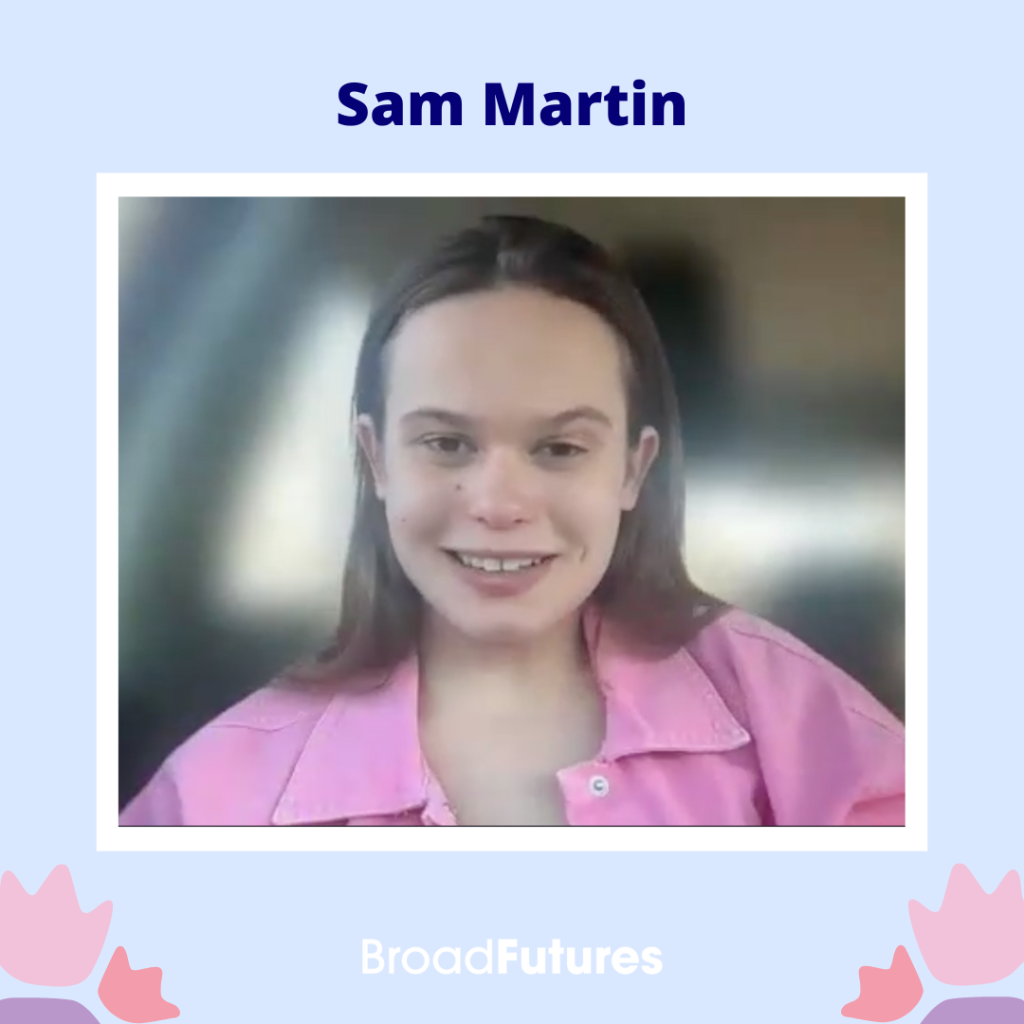
Neurodiversity Acceptance: A Women’s History Month Conversation with Sam Martin

In honor of Women’s History Month, BroadFutures interviewed Samantha “Sam” Martin, a guest on our 2023 Intern Lived Experience Panel. Sam is a driven and passionate self-advocate and young professional who will be graduating from Gettysburg College this spring with a degree in Political Science, Public Policy, and Women, Gender, and Sexuality Studies. She is looking forward to starting her Political Science Ph.D. program at Syracuse University in the Fall. Sam interned at the National Women’s Political Caucus and Public Religion Research Institute here in DC.
Sam reflected on her experiences as a neurodivergent woman in the workplace in an insightful conversation with BroadFutures. Read some of the highlights from their conversation below.
BroadFutures (BF) : This year BroadFutures is focusing on uplifting and supporting the many diverse voices within our community. Could you share more about what that means to you and what community looks like from your perspective?
Sam Martin (SM): [Community] is something that is very important to me. Something I’ve realized about community is that it can be really hard to find when you have autism, especially in these formalized settings like in school and in the workplace.
I’ve struggled a lot with [finding community] historically; I struggled all throughout high school [but] when I got to college there was a really big change in that regard. I started meeting people that I had more in common with and I was able to grow a network beyond what I could ever imagine.
BF: You mentioned the power of community when you were finding it on your own through college; can you talk more about your experience finding community in the workplace?
SM: When I got to DC I worked a number of internships that really helped me build my professional network. [During] my internship with the Public Religion Research Institute [I met] another neurodiverse person in my workplace. Meeting someone with those same neurodiverse traits [as me] who was interested in the same thing I was was so important. It’s been really special finding people, especially other neurodiverse people.
That’s something that I’ve really noticed about BroadFutures and that I really appreciate. The ability to create this neurodiverse network of people who are interested in politics, hospitality, and human social services fields and creating this network of people from across the country [is] such an important thing because connecting with other neurodiverse adults is really hard […] because there aren’t many formal resources. It’s important to build those kinds of networks regardless, but especially among women and non binary people.
BF: You shared that in the past year you interned at the National Women’s Political Caucus and the Public Religion Research Institute. What helped you navigate the workplace as a neurodivergent woman at these internships?
SM: My internship with the Public Religion Research Institute was completely in person and my internship with the National Women’s Political Caucus was completely virtual, so I had to adopt two very different sets of strategies for it. Finding an alliance [and] friendship with [my coworker] was really important and having an employer that understood neurodiversity and was willing to be accepting of it was also super important.
Being able to ask for help and being able to ask for the accommodations was something I had to learn how to do. Also with my boss who was remote, it was a little bit more difficult because I wasn’t [seeing] her on a daily basis, so one of the strategies that I really had to adopt was reminding myself it’s ok to ask for help. It’s ok to ask if you don’t understand something.
Another strategy was my excessive planning and alerts. I often forget when things are due especially when I get into these perfectionist cycles. I really like my work a certain way [and] I want it to be as detailed as possible. And because of that, I sometimes forget about deadlines so I set those reminders so that I can look at my schedule and know exactly how much time I’m going to have to work on something.
BF: Can you share more about your perspective on intersectionality and how you feel that your identity as a neurodiverse person and as a woman have intersected?
SM: I found out [that I had autism] when I was 13 and prior to that, I had only heard of like one or two women who had ever been diagnosed with autism. I honestly saw it as a thing that primarily affected boys and men. That’s how the media represents it, to be frank. It’s represented in a very specific way like we all have the same interests and the same affect.
I saw autism as this very specific diagnosis [before] finding out that it can also look the way I do and the way that a lot of other women and nonbinary people that I’ve met do.
BF: Is there anything that you wish people knew more about neurodiverse women?
SM: We have this very specific stereotype of autism that was the norm for a really long time. This idea of the very “unemotional”, “straight faced”, “logical” man who is either completely non verbal or a brilliant science genius.
I’ve met a lot of autistic people in my life and to say that that is not representative of most of them is an understatement. It’s such a diverse community. We all have such diverse interests and we have diverse passions and we have diverse ways of communicating with other people.
There is no one kind of autistic personality.
And so I’ll describe things that worked for me as an autistic woman in politics and while it might be useful to some people who are also autistic women in politics, it might not be as useful [for others]. Autism is not like a one size fits all personality, it’s something that impacts all aspects of your life, but not in the same way for everybody.
BF: How would you say you practice resilience at work and what’s made you feel empowered to advocate for yourself?
SM: Realizing that I need help and realizing that I can’t be [perfect] all the time is something that I had to learn. You are not going to be perfect all the time especially in a world [that] is not set up for you. And also realizing you are not going to meet everyone’s expectations all the time; that is so important. If you keep on working, if you keep on meeting new people, and you keep on making those connections, you’re going to eventually meet somebody whose expectations fit you and you’re going to find a company where you fit in well with the work atmosphere.
BF: Thank you so much for sharing that wonderful piece of advice. In honor of Women’s History Month, can you share any particular women leaders or trailblazers that have been influential to you in your personal and professional lives?
SM: This is perfect timing actually because I’m visiting my friend, Grace, right now and I want to talk about this story because it’s a really special one. As I said earlier, I got to college at the height of the pandemic and it was very weird because I had spent so much of my life in isolation, and then to be [in college] after that was a weird time, but I had this professor, her name is Professor Douds. She wrote one of my recommendations. She’s one of the reasons I’m going into the field of Public Policy and Political Science; she’s amazing.
I was in her class my first semester and she noticed that I was very talented in the classroom, but that I might struggle a little bit [socially] and she wanted me to be more connected with campus life, so she approached one of the older students, [Grace], and she gave her my phone number and was like “text this girl and go out to lunch with her.”
I started hanging out with her and she introduced me to all of her friends. We would just sit around the table and talk about current events, musical theater, and just whatever we were thinking about. For the first time, I connected with a group of people and Grace really helped me [do that].
I had some really difficult times my sophomore year of college, but that’s another thing about resilience: having support. It’s so important to have support, and I had this incredible support in Grace and she helped me get through some of the hardest times of my life, and I will always be grateful.
BF: What’s one thing that you love about being neurodiverse?
SM: My ability to [delve into] my special interests. I like being able to be really passionate about something and just being able to whip out random information about different social movements. Honestly, it’s helped me connect with people.
BF: If you could sum up one piece of advice that you would give to other young neurodiverse women starting out in their careers, what would you want them to know?
SM: Don’t put yourself in a box and don’t ignore what your brain needs. You will find somebody who will connect with you over [your special interest]. They’re always out there. And, even if you have to do it over the internet, you will find someone who you can connect with, so don’t ignore that aspect of yourself.
Listen to your brain, listen to what your brain needs, ask for help, and ask for those accommodations. Every time you listen to your brain, you only grow stronger. You become a stronger individual, you become a stronger employee, and you become a stronger student.
BF: Thanks so much for sharing your insights and experience with us, Sam. We loved speaking with you and sharing your story!

